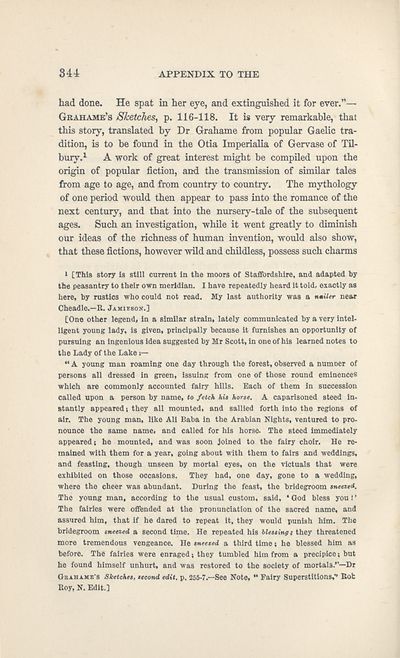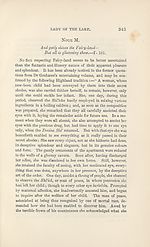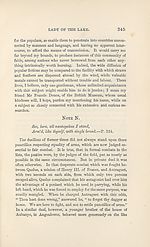Poetry > Lady of the lake
(362)
Download files
Complete book:
Individual page:
Thumbnail gallery: Grid view | List view

344
APPENDIX TO THE
had done. He spat in her eye, and extinguished it for ever.”—
Grahame’s Sketches, p. 116-118. It is very remarkable, that
this story, translated by Dr Grahame from popular Gaelic tra¬
dition, is to be found in the Otia Imperialia of Gervase of Til¬
bury.1 A work of great interest might be compiled upon the
origin of popular fiction, and the transmission of similar tales
from age to age, and from country to country. The mythology
of one period would then appear to pass into the romance of the
next century, and that into the nursery-tale of the subsequent
ages. Such an investigation, while it went greatly to diminish
our ideas of the richness of human invention, would also show,
that these fictions, however wild and childless, possess such charms
i [This story is still current in the moors of Staffordshire, and adapted by
the peasantry to their own meridian. I have repeatedly heard it told, exactly as
here, by rustics who could not read. My last authority was a nuiler near
Cheadle.—R. Jamieson.]
[One other legend, in a similar strain, lately communicated by a very intel¬
ligent young lady, is given, principally because it furnishes an opportunity of
pursuing an ingenious idea suggested by Mr Scott, in one of his learned notes to
the Lady of the Lake
*‘A young man roaming one day through the forest, observed a numoer of
persons all dressed in green, issuing from one of those round eminences
which are commonly accounted fairy hills. Each of them in succession
called upon a person by name, to fetch his horse. A caparisoned steed in¬
stantly appeared; they all mounted, and sallied forth into the regions of
air. The young man, like Ali Baba in the Arabian Nights, ventured to pro¬
nounce the same name, and called for his horse- The steed immediately
appeared; he mounted, and was soon Joined to the fairy choir. He re¬
mained with them for a year, going about with them to fairs and weddings,
and feasting, though unseen by mortal eyes, on the victuals that were
exhibited on those occasions. They had, one day, gone to a wedding,
where the cheer was abundant. During the feast, the bridegroom sneezed.
The young man, according to the usual custom, said, * God bless you!’
The fairies were offended at the pronunciation of the sacred name, and
assured him, that if he dared to repeat it, they would punish him. The
bridegroom sneezed a second time. He repeated his blessing t they threatened
more tremendous vengeance. He sneezed a third time; he blessed him as
before. The fairies were enraged; they tumbled him from a precipice; but
he found himself unhurt, and was restored to the society of mortals.’’—Dr
Grahame's Sketches, second edit. p. 255-7.—See Note, ** Fairy Superstitions,*’ Rob
Roy, N. Edit.]
APPENDIX TO THE
had done. He spat in her eye, and extinguished it for ever.”—
Grahame’s Sketches, p. 116-118. It is very remarkable, that
this story, translated by Dr Grahame from popular Gaelic tra¬
dition, is to be found in the Otia Imperialia of Gervase of Til¬
bury.1 A work of great interest might be compiled upon the
origin of popular fiction, and the transmission of similar tales
from age to age, and from country to country. The mythology
of one period would then appear to pass into the romance of the
next century, and that into the nursery-tale of the subsequent
ages. Such an investigation, while it went greatly to diminish
our ideas of the richness of human invention, would also show,
that these fictions, however wild and childless, possess such charms
i [This story is still current in the moors of Staffordshire, and adapted by
the peasantry to their own meridian. I have repeatedly heard it told, exactly as
here, by rustics who could not read. My last authority was a nuiler near
Cheadle.—R. Jamieson.]
[One other legend, in a similar strain, lately communicated by a very intel¬
ligent young lady, is given, principally because it furnishes an opportunity of
pursuing an ingenious idea suggested by Mr Scott, in one of his learned notes to
the Lady of the Lake
*‘A young man roaming one day through the forest, observed a numoer of
persons all dressed in green, issuing from one of those round eminences
which are commonly accounted fairy hills. Each of them in succession
called upon a person by name, to fetch his horse. A caparisoned steed in¬
stantly appeared; they all mounted, and sallied forth into the regions of
air. The young man, like Ali Baba in the Arabian Nights, ventured to pro¬
nounce the same name, and called for his horse- The steed immediately
appeared; he mounted, and was soon Joined to the fairy choir. He re¬
mained with them for a year, going about with them to fairs and weddings,
and feasting, though unseen by mortal eyes, on the victuals that were
exhibited on those occasions. They had, one day, gone to a wedding,
where the cheer was abundant. During the feast, the bridegroom sneezed.
The young man, according to the usual custom, said, * God bless you!’
The fairies were offended at the pronunciation of the sacred name, and
assured him, that if he dared to repeat it, they would punish him. The
bridegroom sneezed a second time. He repeated his blessing t they threatened
more tremendous vengeance. He sneezed a third time; he blessed him as
before. The fairies were enraged; they tumbled him from a precipice; but
he found himself unhurt, and was restored to the society of mortals.’’—Dr
Grahame's Sketches, second edit. p. 255-7.—See Note, ** Fairy Superstitions,*’ Rob
Roy, N. Edit.]
Set display mode to:
![]() Universal Viewer |
Universal Viewer | ![]() Mirador |
Large image | Transcription
Mirador |
Large image | Transcription
| Antiquarian books of Scotland > Poetry > Lady of the lake > (362) |
|---|
| Permanent URL | https://digital.nls.uk/109511258 |
|---|
| Description | Thousands of printed books from the Antiquarian Books of Scotland collection which dates from 1641 to the 1980s. The collection consists of 14,800 books which were published in Scotland or have a Scottish connection, e.g. through the author, printer or owner. Subjects covered include sport, education, diseases, adventure, occupations, Jacobites, politics and religion. Among the 29 languages represented are English, Gaelic, Italian, French, Russian and Swedish. |
|---|

